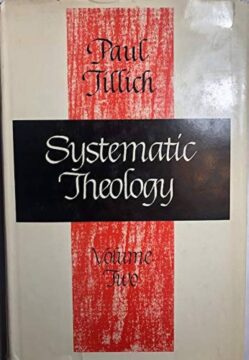Ted Farris at Aeon Magazine:
 One of the most difficult aspects of Tillich’s thought is the ambiguity that characterises much of his writing. Among the most puzzling and paradoxical ideas in his Systematic Theology (1951) is his statement that ‘God does not exist’ and that ‘to argue that God exists is to deny him.’ Tillich goes on to state that the word ‘existence’ should never be used in conjunction with the word ‘God’. These assertions fit with the idea of God as a symbolic object that is a repository of ultimate concern, but not a being. Tillich scholars have disagreed on the meaning and significance of these passages. Does Tillich mean that, since God is ‘beyond essence and existence’ and exists outside of time and space, God is not part of existence? Or is Tillich implying that God really doesn’t exist and is not required to do anything in the Universe? Certainly, in Tillich’s theology, God is an abstract and somewhat inactive concept. The action all comes from the human side through faith. God is the unreachable object of our ultimate concern. This illustrates some of the difficulties of interpreting Tillich’s intentionally paradoxical and deliberately ambiguous assertions as he tries to avoid discussing the literal nature of God.
One of the most difficult aspects of Tillich’s thought is the ambiguity that characterises much of his writing. Among the most puzzling and paradoxical ideas in his Systematic Theology (1951) is his statement that ‘God does not exist’ and that ‘to argue that God exists is to deny him.’ Tillich goes on to state that the word ‘existence’ should never be used in conjunction with the word ‘God’. These assertions fit with the idea of God as a symbolic object that is a repository of ultimate concern, but not a being. Tillich scholars have disagreed on the meaning and significance of these passages. Does Tillich mean that, since God is ‘beyond essence and existence’ and exists outside of time and space, God is not part of existence? Or is Tillich implying that God really doesn’t exist and is not required to do anything in the Universe? Certainly, in Tillich’s theology, God is an abstract and somewhat inactive concept. The action all comes from the human side through faith. God is the unreachable object of our ultimate concern. This illustrates some of the difficulties of interpreting Tillich’s intentionally paradoxical and deliberately ambiguous assertions as he tries to avoid discussing the literal nature of God.
more here.
